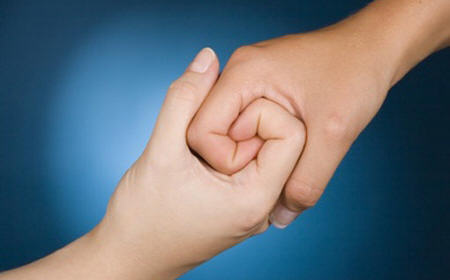I really feel that some people neglect and overlook compassion because they associate it with religion. Of course, everyone is free to choose whether they pay religion any regard, but to neglect compassion is a mistake because it is the source of our own well-being.
Dalai Lama
A pair of recent reports indicate that things may be looking up on that front.
1. Atheists and agnostics are more driven by compassion to help others than are high religious people, a new study finds.
That doesn’t mean highly religious people don’t give, according to the research published in the July 2012 issue of the journal Social Psychological and Personality Science. But compassion seems to drive religious people’s charitable feelings less than other groups.
“Overall, we find that for less religious people, the strength of their emotional connection to another person is critical to whether they will help that person or not,” study co-author and University of California, Berkeley social psychologist Robb Willer said in a statement. “The more religious, on the other hand, may ground their generosity less in emotion, and more in other factors such as doctrine, a communal identity, or reputational concerns.”
2. A recent Pew Research Center poll shows that nearly one-fifth of all U.S. adults, including over 30 percent of adults age 30 and under, now list their religious affiliation as “none.”

Data from Pew Research’s report, “Nones” on the Rise: One-in-Five Adults Have No Religious Affiliation, indicates that the number of adult Americans who identify themselves as not being connected with any religion has grown from just over 15% to just under 20% in the last five years alone.
The “nones” include more than 13 million self-described atheists and agnostics, representing nearly 6 percent of the U.S. public, and 33 million people -- 14 percent of the public -- who say they have no particular religious affiliation.
Many of those 46 million people still describe themselves as being “religious or spiritual in some way.” Almost 68 percent of the “nones” say they believe in God, and 58 percent say they “often feel a deep connection with nature and the earth.” Overall, 37 percent say they are “spiritual” but not “religious,” and 21 percent report praying daily. In addition, most of the “nones” responded that they felt that churches and religion in general strengthen communities and help the poor.
Pew’s analysis says an overwhelming majority of the “nones” have abandoned traditional religion because they feel religious organizations have too many inflexible rules and are too focused on power, money, and politics. It cites research conducted at the University of California, Berkeley, that shows many young adults feel that organized religion has become too deeply involved with conservative politics -- the “religious right.”
Pew points to the book, American Grace: How Religion Divides and Unites Us, by Robert Putnam of Harvard University and David Campbell of Notre Dame, in which the authors suggest that stance of many organized religions on politically-charged issues like abortion, gay rights, and same-sex marriage have caused many young Americans to view religion as “judgmental, homophobic, hypocritical, and too political.”
In separateness lies the world's great misery; in compassion lies the world's true strength. -- Buddha
Dalai Lama
A pair of recent reports indicate that things may be looking up on that front.
1. Atheists and agnostics are more driven by compassion to help others than are high religious people, a new study finds.
That doesn’t mean highly religious people don’t give, according to the research published in the July 2012 issue of the journal Social Psychological and Personality Science. But compassion seems to drive religious people’s charitable feelings less than other groups.
“Overall, we find that for less religious people, the strength of their emotional connection to another person is critical to whether they will help that person or not,” study co-author and University of California, Berkeley social psychologist Robb Willer said in a statement. “The more religious, on the other hand, may ground their generosity less in emotion, and more in other factors such as doctrine, a communal identity, or reputational concerns.”
2. A recent Pew Research Center poll shows that nearly one-fifth of all U.S. adults, including over 30 percent of adults age 30 and under, now list their religious affiliation as “none.”
The “nones” include more than 13 million self-described atheists and agnostics, representing nearly 6 percent of the U.S. public, and 33 million people -- 14 percent of the public -- who say they have no particular religious affiliation.
Many of those 46 million people still describe themselves as being “religious or spiritual in some way.” Almost 68 percent of the “nones” say they believe in God, and 58 percent say they “often feel a deep connection with nature and the earth.” Overall, 37 percent say they are “spiritual” but not “religious,” and 21 percent report praying daily. In addition, most of the “nones” responded that they felt that churches and religion in general strengthen communities and help the poor.
Pew’s analysis says an overwhelming majority of the “nones” have abandoned traditional religion because they feel religious organizations have too many inflexible rules and are too focused on power, money, and politics. It cites research conducted at the University of California, Berkeley, that shows many young adults feel that organized religion has become too deeply involved with conservative politics -- the “religious right.”
Pew points to the book, American Grace: How Religion Divides and Unites Us, by Robert Putnam of Harvard University and David Campbell of Notre Dame, in which the authors suggest that stance of many organized religions on politically-charged issues like abortion, gay rights, and same-sex marriage have caused many young Americans to view religion as “judgmental, homophobic, hypocritical, and too political.”
In separateness lies the world's great misery; in compassion lies the world's true strength. -- Buddha


No comments:
Post a Comment